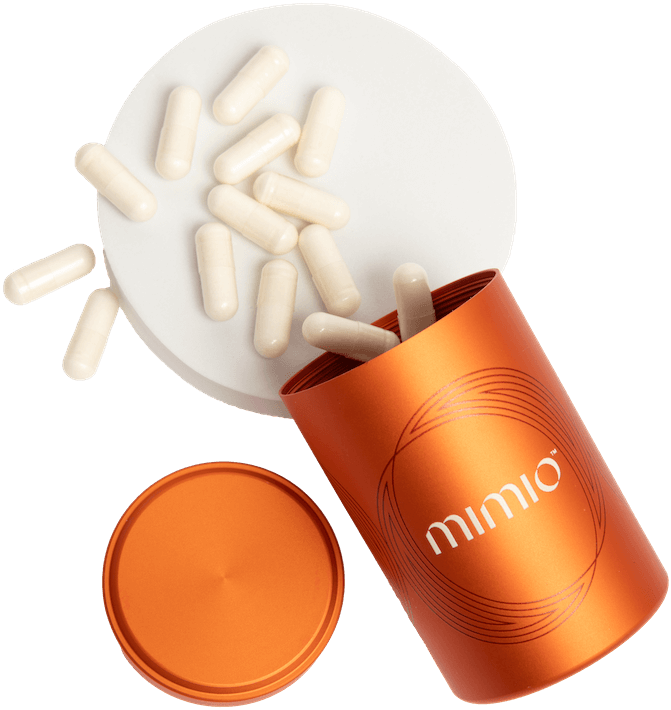Aging Starts in Your Cells: Specifically, in Your Mitochondria
We often think of aging as something that can be seen from the outside in, (think wrinkles, gray hair, slower movement, etc). But true aging starts deep within our bodies - actually, deep within our cells: mitochondria. These tiny powerhouses inside your cells are more than just energy generators; they're the unsung heroes of your healthspan and longevity.
The better your mitochondrial health, the better your energy levels, your metabolic efficiency, and your body’s ability to fend off chronic disease. Have worse mitochondrial health? You could be more likely to experience fatigue, cognitive decline, and cellular breakdown. So if you're looking for a real longevity lever, it’s time to meet your mitochondria.
What Are Mitochondria and Why Do They Matter?
Mitochondria are often called the "power plants" of cells. They convert nutrients into ATP (adenosine triphosphate), the energy currency your body needs to function. But they’re not just passive players; they also regulate cell death, inflammation, and stress responses¹.
As we age, mitochondrial function declines. As damaged mitochondria accumulate, energy production dips, and oxidative stress skyrockets. This mitochondrial dysfunction is closely tied to aging and chronic diseases like Alzheimer’s, heart disease, and type 2 diabetes².
Optimizing mitochondrial health isn’t just about feeling more energized—it’s a foundational strategy for living longer, healthier, and better.
Signs Your Mitochondria Might Be Struggling
Mitochondrial Health Checklist
|
Symptom |
What It Could Mean |
Action to Take |
|
Chronic Fatigue |
Low ATP production |
Prioritize sleep, consider CoQ10 & Mimio |
|
Brain Fog |
Mitochondrial dysfunction in the brain |
Try polyphenol-rich foods & light cardio |
|
Slow Recovery |
Poor mitochondrial biogenesis |
Add resistance training & NAD+ support |
|
Mood Swings |
Impaired neurotransmitter synthesis |
Increase omega-3s & manage stress |
|
Blood Sugar Spikes |
Metabolic inflexibility |
Adopt time-restricted eating |
Tip: If you checked off 2 or more symptoms, your mitochondria might need some attention.
Your body gives subtle clues when your mitochondria need help, including:
-
Persistent fatigue or brain fog
-
Poor exercise recovery
-
Blood sugar imbalances
-
Chronic inflammation
-
Low mood or irritability
These aren’t just random symptoms—they’re your cells firing off signals that your cellular engines are in need of some attention. The good news? Mitochondria are incredibly responsive to lifestyle and nutritional changes.
1. Eat for Energy: Nutrients That Supercharge Mitochondria
Your diet and the foods you consume directly impact mitochondrial health. The right foods nourish your cells, reduce oxidative stress, and even tell your body to produce new mitochondria through a process called mitochondrial biogenesis³.
Top Mitochondrial Boosters:
-
Coenzyme Q10 (CoQ10): Critical for ATP production. Found in fatty fish, organ meats, and supplements.
-
Alpha-lipoic acid: An antioxidant that also helps regulate blood sugar.
-
Polyphenols: Found in colorful fruits and veggies, these compounds combat oxidative stress and enhance mitochondrial function³.
-
Omega-3 fatty acids: Support mitochondrial membranes and reduce inflammation.
-
B Vitamins: Essential cofactors for mitochondrial enzymes.
For a full breakdown of longevity-focused foods, check out Top Foods for Longevity: A Comprehensive Guide.
2. Train Smarter, Not Just Harder
Movement is mitochondrial medicine. Exercise increases mitochondrial density and efficiency, meaning your cells literally get better at producing energy⁴.
Best Mitochondria-Friendly Workouts:
-
High-Intensity Interval Training (HIIT): Triggers mitochondrial biogenesis.
-
Resistance training: Builds muscle, which hosts more mitochondria per cell.
-
Zone 2 cardio (low-intensity): Boosts mitochondrial endurance over time.
Even just 30 minutes of movement a day can spark noticeable improvements in energy and cognitive function. Not sure where to start? Mimio’s guide to optimal exercise for longevity lays it all out.
3. Mimic the Metabolic Magic of Fasting
Fasting is a powerful cellular reset. When you take a break from eating, your body shifts from using glucose to burning fat and ketones—boosting mitochondrial resilience and initiating autophagy (your cells' internal cleanup process)⁵.
But not everyone can fast for 24–36 hours. That’s where Mimio Biomimetic Cell Care comes in. Mimio was designed to replicate the effects of a 36-hour fast, supporting mitochondrial repair, autophagy, and metabolic balance without needing to skip meals.
This is a game-changer for:
-
People who want fasting benefits without the hunger
-
Those with medical conditions that limit fasting
-
Anyone looking to enhance their cellular regeneration without lifestyle extremes
-
People who are already seasoned fasters, and are looking for the next step up
4. Sleep: The Night Shift for Mitochondria
During sleep, your brain and body go into deep repair mode. Mitochondria are cleared of debris, cells are detoxified, and energy reserves are replenished. Sleep deprivation, on the other hand, disrupts mitochondrial function and spikes oxidative stress⁶.
Tips to optimize sleep:
-
Stick to a consistent bedtime and wake time
-
Avoid screens 1 hour before bed
-
Incorporate magnesium or herbal teas for relaxation
-
Consider tracking sleep quality with wearables
5. Support with Mitochondrial-Targeted Supplements
Certain supplements are scientifically backed to support mitochondrial performance:
-
PQQ (Pyrroloquinoline quinone): Stimulates the growth of new mitochondria
-
Resveratrol: Activates pathways linked to mitochondrial biogenesis
-
Acetyl-L-carnitine: Aids in fatty acid transport into mitochondria for energy production
-
NAD+ boosters (e.g. NR or NMN): Support cellular energy and longevity pathways⁷
Mimio’s Biomimetic Cell Care incorporates key nutrients to support these exact pathways—offering a daily shortcut to peak cellular performance.
6. Cool it on the Toxins
Environmental toxins like heavy metals, pesticides, and pollutants can accumulate in tissues and damage mitochondria. Detoxification doesn’t have to mean juice cleanses—just be smart:
-
Choose organic when possible
-
Use clean personal care and cleaning products
-
Support your liver with cruciferous veggies and dandelion
-
Sweat regularly (through exercise or sauna)⁸
7. Reduce Chronic Stress
High cortisol levels (one of the most significant side effects of high stress) suppress mitochondrial activity and impair cellular regeneration. Simple practices like breathwork, meditation, and spending time in nature can reverse this effect⁹. Think of it as charging your battery instead of draining it.
Mitochondrial Health = Longevity Insurance
Your mitochondria determine how fast you age, how sharp your brain stays, and how vibrant you feel each day. By supporting them through smart nutrition, movement, supplements like Mimio, and stress management, you're giving your body the tools it needs to thrive for decades.
Mitochondrial Optimization Timeline
|
Timeframe |
Action |
Mitochondrial Benefit |
|
Day 1 |
Begin 16:8 intermittent fasting |
Start metabolic switch, reduce insulin |
|
Day 3 |
Add polyphenol-rich foods |
Decrease oxidative stress |
|
Week 1 |
Start Mimio Biomimetic Cell Care |
Mimic 36-hour fast, boost autophagy |
|
Week 2 |
Introduce HIIT & strength training |
Increase mitochondrial density |
|
Month 1 |
Improve sleep & reduce toxins |
Restore cellular efficiency |
⏳ Small shifts add up. In just 4 weeks, you can kickstart mitochondrial renewal and feel the difference in your energy and longevity.
You don't have to go all-in on biohacking or extreme fasting. Start with one change, build momentum, and let your mitochondria do the rest. Because the best version of you—more energized, resilient, and long-lived, is powered from within.
References
-
Wallace, D. C. (2013). Mitochondrial DNA mutations in disease and aging. Environmental and Molecular Mutagenesis
-
López-Otín, C., et al. (2013). The hallmarks of aging. Cell
-
Picard, M., et al. (2016). Mitochondrial dysfunction and healthspan in aging. Trends in Endocrinology & Metabolism
-
Radak, Z., et al. (2013). Exercise and hormesis: Oxidative stress-related adaptation. Journal of Sports Sciences
-
Madeo, F., et al. (2019). Senolytics and fasting mimetics: Targeting aging mechanisms. Nature Reviews Drug Discovery
-
Irwin, M. R. (2015). Why sleep is important for health: A psychoneuroimmunology perspective. Annual Review of Psychology
-
Chandel, N. S. (2015). Evolution of mitochondria as signaling organelles. Cell Metabolism
-
Packer, L., & Cadenas, E. (2011). Oxidants and antioxidants revisited: New concepts of oxidative stress. Free Radical Research
-
Belkaid, Y., & Hand, T. W. (2014). Role of the microbiota in immunity and inflammation. Cell



